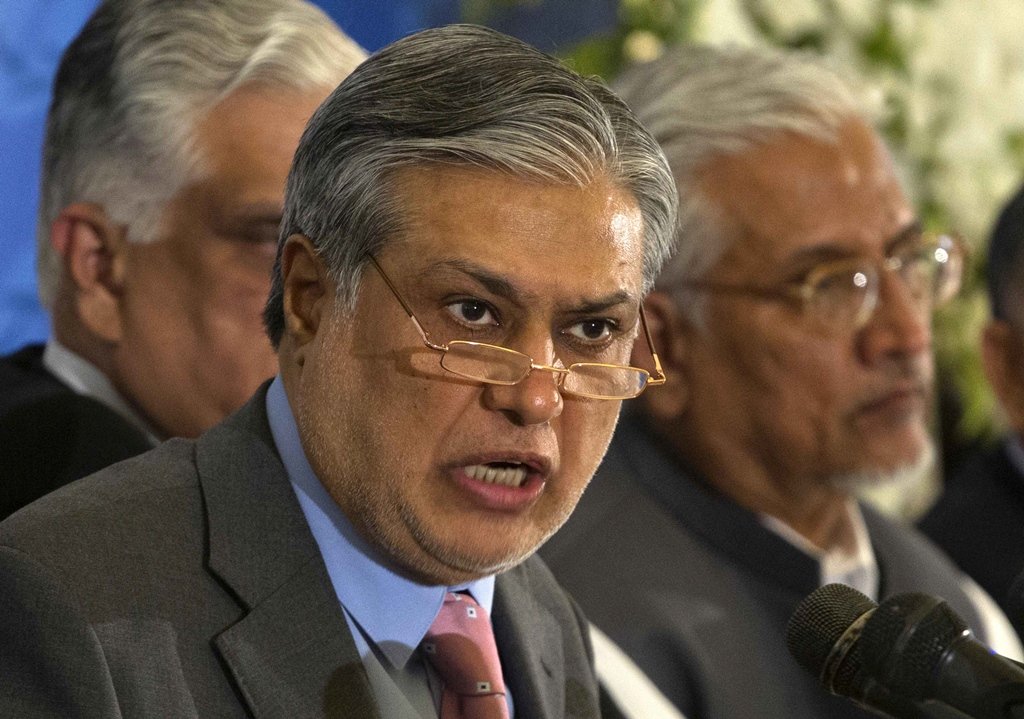
Less than two weeks after announcing a budget that sought to aggressively increase taxes on many previously exempt sectors, Finance Minister Ishaq Dar appeared to partially retreat from that stance, announcing reductions or outright withdrawals for many of the tax increases proposed in his budget speech on June 5. He also announced a subsidy package for the agriculture sector worth Rs20 billion.
In the final speech of the budget debate in the National Assembly, which lasted just nine days, Dar announced tax cuts on pesticides and poultry feeds, reduced taxation on bank transactions, lowered the increase in taxes on soft drinks, media advertising, and commodities exchange trading, and announced subsidies for phosphorus fertiliser.
In a partial reversal of the biggest tax proposal of his 2016 budget, Dar announced that the 0.6% withholding tax on bank withdrawals for people who do not file their tax returns will not be enforced for transactions below Rs50,000. The initial proposal had contained no exemption and would have helped the government raise Rs35 billion in tax revenue next year.
The overall impact of the government’s proposed changes to the budget from the initial proposals will be Rs4 billion, said one official at the Federal Board of Revenue.
Agriculture package
Dar announced that the government will set up a Rs20 billion fund for subsidising phosphorus fertilizer, the burden for which will be shared with the provincial governments. The government also lowered the sales tax on pesticides from 17% to 7%. However, the 7% tax will be the final liability and the government will not process refunds for this tax. The government will also extend the repayment period of the Rs1 million loans for solar tube-well installation from five years to seven years.
In the outgoing fiscal year, the government had collected Rs4.5 billion from the 17% sales tax on pesticides, said FBR Chairman Tariq Bajwa last week. The government also abolished customs duties on the import of oil seed and halved the sales tax rate on oil seeds from 10% to 5%.
“These steps have been taken to enhance productivity in the agriculture sector, which constitutes 21% of the total size of the national economy,” said Dar.
Similarly, the government has withdrawn the 5% sales tax imposed on domestic supplies of poultry and cattle feeds but retained the 5% taxes on poultry feed at the import stage. Dar said 5% tax would have resulted in a Rs9.46 per kilogramme increase in the prices of chicken.
Quasi-provincial status for FATA, G-B, AJK
Dar also extended his party’s support to the idea of amending the constitution that would allow the Federally Administered Tribal Areas, Gilgit-Baltistan, and Azad Jammu & Kashmir to get allocations from the National Finance Commission Awards directly, rather than having the federal government give them grants from its own share. Should the move go ahead, it would effectively give these special regions the same financial status as provinces.
Industrial taxes and incentives
The government lowered the proposed federal excise duty on aerated water from 12% to 10.5%. Before the new budget, the FED rate on aerated water was 9%. At 10.5% the government will still earn an additional Rs1.5 billion in revenue, but Dar said the industry has assured the government that it will not raise the prices of soft drinks.
Dar also announced a three-year tax holiday lasting till June 2018 for any company seeking to set up mobile phone manufacturing in Pakistan. The machinery imported for such factories will be exempted from customs duties and sales tax. In addition, in the first year, the industry will be entitled to a 90% depreciation allowance. The government also extended the tax holiday for investment in halal food industry till June 2017.
The minister also announced a three-year income tax holiday for companies setting up manufacturing units in any industry in Balochistan. The government also decided that exports of perishable food items to Afghanistan from Balochistan can now be done in Pakistani rupees – a facility that is already available to Khyber-Pakhtunkhwa.
For the media industry, the government lowered the proposed 10% withholding tax on advertisement income to 1% for those media houses who file income tax returns. However, for non-filing individuals, it has proposed a 12% withholding tax and for companies the new rate will be 15%.
In the budget, the government had announced a 10% withholding tax on those companies that do not distribute profits among shareholders and their reserves income is 100% of their paid up capital. However, after encountering severe criticism, Dar announced that the 10% tax will be applicable only if undistributed profit is 40% or 50% of a company’s paid-up capital.
Dar also exempted mutual funds from the levy of Workers Welfare Fund. He also extended the tax credit for the extension, expansion, balancing, modernisation and replacement of the plant and machinery from the end of fiscal 2015 to the end of fiscal 2016.
Dar also extended the tax credit to companies investing in the installation of plant and machinery with 100% new equity raised through the issuance of new shares for another two years, through to the end of fiscal year 2018. Currently the credit is allowable from the machinery’s year of installation. This will be changed to the date of commencement of commercial production.
The minister also said that the government exempted expatriate Pakistanis who purchase immovable property by sending remittances directly to the State Bank of Pakistan from advance income tax.
Supplementary budget and debt
Dar defended his government’s Rs136 billion supplementary budget for fiscal 2015, insisting that it was only 4% of the original budget and far less than those issued by the Zardari Administration. He said the supplementary grants had to be issued to cover the cost of electricity, wheat, sugar, and fertiliser subsidies.
He also announced that the government had decided to accept 56 of the 92 amendments proposed by the Senate.
Dar reiterated that Budget 2016 was a pro-poor budget and insisted that the government had increased burden on rich, particularly by withdrawing Rs120 billion worth of tax exemptions that had been granted through Statutory Regulatory Orders (SROs).
Dar admitted that the government was in violation of the 2005 Fiscal Responsibility and Debt Limitation Act and the country’s debt-to-Gross Domestic Product ratio was far above than the permissible limit of 60%. However, he said that the Zardari Administration had also violated this Act.
Published in The Express Tribune, June 19th, 2015.
1732503274-0/Untitled-design-(43)1732503274-0-405x300.webp)
1732501636-0/Untitled-design-(42)1732501636-0-165x106.webp)

1732498967-0/Outer-Banks--(1)1732498967-0-165x106.webp)
1732086766-0/BeFunky-collage-(74)1732086766-0-165x106.webp)












COMMENTS (4)
Comments are moderated and generally will be posted if they are on-topic and not abusive.
For more information, please see our Comments FAQ